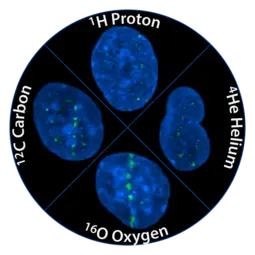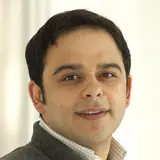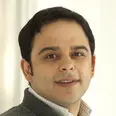Translational Radiation Oncology
- Imaging and Radiooncology
- Clinical Cooperation Unit

Prof. Dr. Amir Abdollahi
Radiotherapy is an integral component of cancer therapy. More than 50% of all cancer patients receive radiotherapy during their course of disease. Therefore, improvements of this therapy modality significantly impact the quality of life of cancer patients. The translational research team of the Heidelberg Institute of Radiation Oncology (HIRO) constitutes of a worldwide unique interdisciplinary alliance of physicists, biologist, engineers, computer scientists and clinicians.

Our Research
The team has consistently contributed to the key translational developments in this field. The emergence of raster scanning particle therapy (protons and heavier ions) via establishment of Heidelberg Ion Therapy centre (HIT) is one of the latest landmark achievements of this alliance. In terms of conformal delivery of a potent anticancer agent to tumor by simultaneous sparing of surrounding normal tissue, high precision radiotherapy at HIT challenges recent oncotechnological developments and approaches the physical limits of non-invasive delivery of ionizing agents.
To improve the overall survival of cancer patient, it is conceivable that advances in local tumor control achieved by high-precision radiotherapy needs to be combined with rationally designed targeted tumor therapies. To this end, this unit has successfully established a unique interface between clinician scientists and biologist to integrate the rapidly evolving field of cellular- and molecular biology in radiation oncology. A better understanding of the molecular mechanisms underlying tumor-stroma-communication in response to radiotherapy was instrumental in development of novel rationally designed multimodal therapies and biological predictors of therapy response.
Abdollahi’s group was one of the first to employ genome-wide transcriptional analysis and protein phosphorylation analysis to systematically investigate the perturbation of the cellular homeostasis induced by ionizing radiation and anti-/pro-angiogenesis. These discoveries has built a foundation to better understand inter-cellular communication and intra-cellular signalling principles induced by radiation and angiogenesis modulators and unravelled key mechanisms governing tumor therapy resistance - a major obstacle of cancer therapy.
Their data indicate that tumor-stroma and tumor-vessel communication i.e., microvasculature endothelial cells constitute a critical target of conventional cancer therapies, such as radiation and chemotherapy. Subsequently, molecular, cellular and physiological rationales for the beneficial use of trimodal cancer therapy (consisting of anti-angiogenesis, radiotherapy and chemotherapy) were provided. The translational impact of this research on the development of novel clinical protocols is evident from the growing number of trimodal trials in solid tumors initiated in Heidelberg and worldwide.
Intriguingly, they could also show that inhibition of PDGF signaling ameliorates the development of radiation –induced lung fibrosis, a critical side effect and dose limiting normal tissue response of radiotherapy. In addition this group has recently discovered the potential of peripheral blood transcriptome and miRs as a sentinel organ to properly detect tumor stage and predict clinical outcome.
The mission of this group is to develop the next generation radiation Oncology to provide the best individualized care for cancer patients. The translational radiation oncology team is integrated in Heidelberg Ion Therapy Center (HIT) and National Center for Tumor diseases (NCT).
Selected research highlights:
Integrative Molecular Biology of Proton and Carbon Ion Radiation: The introduction of proton- and heavy ion- irradiation into the clinic constitutes a new and promising development in radiotherapy. Empirical and phenomenological data postulate a higher biological efficiency of particle beam irradiation compared to conventional photon irradiation, however, there is an urgent need for systematic molecular characterization of this novel type of treatment. A major goal of this group is to generate an integrative molecular biology platform for identification of cell-cell and intracellular signaling networks induced by photon, proton and carbon irradiation incorporating transcriptomics, miRNA, epigenomics, proteomics and functional genomics approaches. These data will be instrumental in identification of novel molecular targets for modulating the radiation response, i.e., enhancing the anti-tumor effects while sparing surrounding normal tissue from radiation induced damage. They further aim to better understand the mechanism of local invasion and distant metastasis of tumors, the two key mechanism of therapy failure after multimodal local therapies.
Identify molecular predictors and therapy surrogates for Radiotherapy. The field of radiotherapy still lacks powerful biomarker and molecular classifier of therapy response. Therefore they seek to design peripheral blood transcriptome and miRNA based patient classifier that would assist clinicians in selecting those patients likely to benefit most from the local multimodal therapies.
Unravel the mechanisms of tumor resistance against radiotherapy and adjuvant maintenance antiangiogenic therapy. The major goal of the group is to optimize local tumor control via rational design of multimodal therapies consisting of radiotherapy and tumor stroma targeting agents. A critical step towards this goal is the systematic investigation of compensatory mechanisms that render tumors resistance to radiotherapy and targeted i.e., antiangiogenic cancer therapies.
Early detection of tumors, prediction of tumor evasive mechanisms to multimodal therapies and rational design of anti-angiogenic combinations will direct cancer therapy towards its ultimate goal - the conversion of cancer to a dormant, chronic, manageable disease.
Projects
We are advancing particle radiotherapy by reducing biophysical uncertainties and integrating cutting-edge imaging, multi-ion treatment plans, and novel delivery methods like spot-scanning hadron arc (SHArc) therapy. Our work includes precise tumor delineation using multimodal imaging, AI-driven radiomics, and biophysical modeling. We are also exploring FLASH particle therapy to selectively spare normal tissue while enhancing tumor control, particularly for radioresistant tumors such as glioblastoma. Our ultimate goal is to maximize treatment efficacy while minimizing damage to surrounding healthy tissue.
We investigate how radiotherapy influences the tumor immune microenvironment (TIME) and how it can be leveraged for improved cancer treatment. Our research focuses on enhancing immune priming by combining radiotherapy with TGF-β inhibition and checkpoint blockade to convert immune “cold” tumors into responsive “hot” tumors. We explore key immune-modulating factors, study abscopal effects, and refine personalized in-situ tumor vaccination approaches to optimize the therapeutic response.
By integrating molecular, cellular, and imaging data, we develop biomarkers and predictive models to tailor radiotherapy for individual patients. A key focus is on stratifying patients with head and neck cancers based on tumor hypoxia and immune profiles to guide therapy intensification or de-escalation. Our research also aims to predict tumor evolution under radiotherapy and identify novel biological targets to enhance treatment response at both local and distant tumor sites.
-

Prof. Dr. Amir Abdollahi
-
Claudia Rittmüller
-
Maximilian Knoll
-
Dr. Bouchra Tawk
-
Dr. Julian Schlegel
-
Dr. Jennifer Furkel
-
Allegra Gerharz
-
Matilde Recusani
-
Neele Haxel
-
Tim Kuhnert
Selected Publications
Tawk B, Rein K, Schwager C, Knoll M, Wirkner U, Hörner-Rieber J, Liermann J, Kurth I, Balermpas P, Roedel C, Linge A, Loeck S, Lohaus F, Tinhofer I, Krause M, Stuschke M, Grosu AL, Zips D, Combs SE, Belka C, Stenzinger A, Herold-Mende C, Baumann M, Schirmacher P, Debus J, Abdollahi A
Dokic I, Meister S, Bojcevski J, Tessonnier T, Walsh D, Knoll M, Mein S, Tang Z, Vogelbacher L, Rittmueller C, Moustafa M, Krunic D, Brons S, Haberer T, Debus J, Mairani A, Abdollahi A
Adeberg S, Knoll M, Koelsche C, Bernhardt D, Schrimpf D, Sahm F, König L, Harrabi SB, Hörner-Rieber J, Verma V, Bewerunge-Hudler M, Unterberg A, Sturm D, Jungk C, Herold-Mende C, Wick W, von Deimling A, Debus J, Rieken S, Abdollahi A
Lan Y, Moustafa M, Knoll M, Xu C, Furkel J, Lazorchak A, Yeung TL, Hasheminasab SM, Jenkins MH, Meister S, Yu H, Schlegel J, Marelli B, Tang Z, Qin G, Klein C, Qi J, Zhou C, Locke G, Krunic D, Derner MG, Schwager C, Fontana RE, Kriegsmann K, Jiang F, Rein K, Kriegsmann M, Debus J, Lo KM, Abdollahi A
Tawk B, Wirkner U, Schwager C, Rein K, Zaoui K, Federspil PA, Adeberg S, Linge A, Ganswindt U, Hess J, Unger K, Tinhofer I, Budach V, Lohaus F, Krause M, Guberina M, Stuschke M, Balermpas P, Rödel C, Grosu AL, Schäfer H, Zips D, Combs SE, Pigorsch S, Zitzelsberger H, Baumeister P, Kirchner T, Bewerunge-Hudler M, Weichert W, Hess J, Herpel E, Belka C, Baumann M, Debus J, Abdollahi A
Chiblak S, Tang Z, Lemke D, Knoll M, Dokic I, Warta R, Moustafa M, Mier W, Brons S, Rapp C, Muschal S, Seidel P, Bendszus M, Adeberg S, Wiestler OD, Haberkorn U, Debus J, Herold-Mende C, Wick W, Abdollahi A
Zhou C, Moustafa MR, Cao L, Kriegsmann M, Winter M, Schwager C, Jones B, Wang S, Bäuerle T, Zhou PK, Schnölzer M, Weichert W, Debus J, Abdollahi A
Abdollahi A, Folkman J
Get in touch with us

